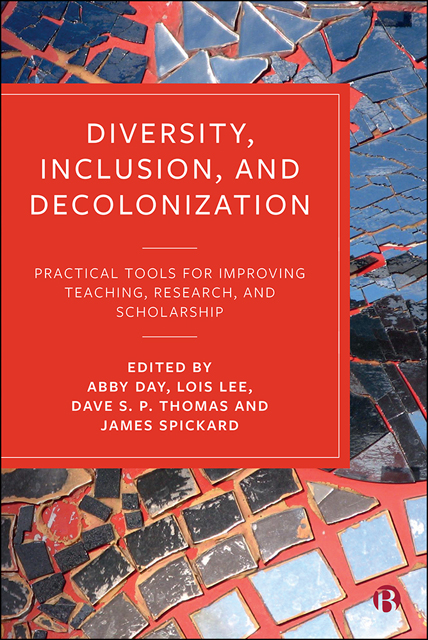 Diversity, Inclusion, and Decolonization
Diversity, Inclusion, and Decolonization Book contents
- Frontmatter
- Contents
- List of Figures and Tables
- Notes on Contributors
- Acknowledgements
- Typographical Note
- Introduction: Why Diversity, Inclusion, and Decolonization Matter
- Part I Changing Universities
- Part II Diversifying Curricula
- Part III Diversifying Research and Scholarship
- Part IV Overcoming Intellectual Colonialism
- Epilogue: What We Have Learned
- Index
8 - Decolonizing Research Methods: Practices, Challenges, and Opportunities
Published online by Cambridge University Press: 13 October 2022
- Frontmatter
- Contents
- List of Figures and Tables
- Notes on Contributors
- Acknowledgements
- Typographical Note
- Introduction: Why Diversity, Inclusion, and Decolonization Matter
- Part I Changing Universities
- Part II Diversifying Curricula
- Part III Diversifying Research and Scholarship
- Part IV Overcoming Intellectual Colonialism
- Epilogue: What We Have Learned
- Index
Summary
Introduction
Raising and addressing decolonizing perspectives and approaches through every stage of the research process, regardless of discipline, creates numerous opportunities and challenges. It is fundamentally based on the reconsideration of the concepts and priorities of academic practices in higher education (HE), including their links with research, curriculum development and teaching. A key feature of this project is exploring pedagogical approaches that explicitly solicit, incorporate, and validate individual experiences and research interests. Classroom encounters are thus reconceptualized as ones which engender emotional, intellectual, conceptual, and cognitive transformations (Takacs, 2002), all of which impact on the choices students make in their own research practices. Incorporating disciplinary conventions and interdisciplinary imagination expands the relevance and impact of these efforts. The reciprocal influence between research and curriculum serves to create, disseminate, and share knowledge, so the ultimate aim is to galvanize research, curricular, and pedagogical reforms that better represent and include the social, economic, and political concerns of Goldsmiths’ diverse student body and community, creating an experience of belonging and aspiration.
Goldsmiths is a public university located in south-east London that is known for its emphasis on creative, cultural, and political subjects, and which has a strong and enduring reputation for radical curricula and research. The liberal HE on offer at Goldsmiths is predicated on a publicly stated encouragement and acceptance of the diversity that decolonization both implies and demands. However, a failure to adequately engage with meaningful definitions of difference and the dialogue it requires obfuscates the norms and mechanisms of power that underpin relationships in academia. The 2018– 23 Goldsmiths Strategic Plan (2018) claims that ‘students will continue to have a voice in developing and diversifying our curriculum and we will continue to engage with the Goldsmiths Students’ Union’s “Liberate My Degree” campaign, ensuring that programme developments are informed by a range of voices, experiences, and global perspectives’. This declaration of priorities can be seen as an instantiation of what Sara Ahmed (2012) calls the performativity of valuing diversity as an official act, since the institution itself does not act on these stated goals. Instead, the practical implementation of ‘liberation’ is left to academics, who must be interested, motivated, and free to make decisions and take supporting action.
- Type
- Chapter
- Information
- Diversity, Inclusion, and DecolonizationPractical Tools for Improving Teaching, Research, and Scholarship, pp. 125 - 139Publisher: Bristol University PressPrint publication year: 2022


